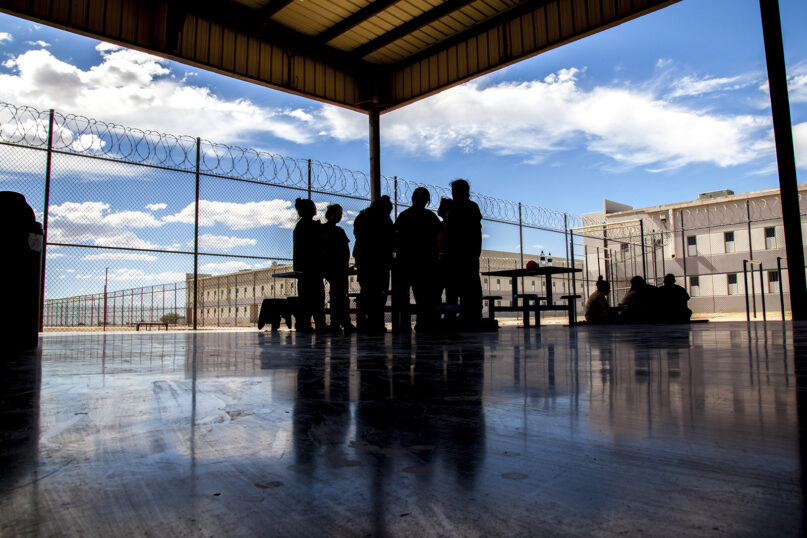(RNS) — I was familiar with the cold, concrete visitation room: The walls were bare, the lighting too bright, the silence unsettling. In the same room I had first met Badar Khan Suri — the Georgetown University professor and father of young children who was one of many swept into ICE detention for daring to speak out against genocide.
Thankfully, Badar was released. The government has shamefully filed an appeal, but for now, he is where he belongs: at home in Virginia, surrounded by his wife and children. I had the blessing of greeting him at the detention center door on the very day he was released. It was May 14, at 1:30 p.m.
By 2 p.m., I was back in the same visitation room, not to celebrate a release, but to see a forgotten prisoner. No one outside of a handful of attorneys and a few organizers even knows her name.
She is Leqaa Kordia, a young Palestinian who had been taken from her life and thrown into Prairie Land Detention Center in Texas. Someone who had protested the murder of more than 100 of her family members in Gaza and, in response, had been abducted by U.S. Immigration and Customs Enforcement.
I only learned about her when Badar’s legal team mentioned a fellow detainee.
My immediate request to visit her was denied. I tried again for the next day and was denied again. Finally given permission to visit May 14 at 2 p.m., which turned out to be a half hour after Badar was released. That was God’s plan. I got to see Badar step into the sunlight as a free man, and then I walked back into the prison to meet someone still buried in its shadows.
Leqaa told me her story with quiet resolve. She spoke of being held in overcrowded cells for several weeks. Sleeping on concrete. Being denied halal food and basic hijab and clothing accommodations. No respect for modesty when male guards entered the cell. Denied accommodations to fast during Ramadan. Months of this. Alone.

Detainees at U.S. Immigration and Customs Enforcement’s Eloy Detention Facility in Eloy, Ariz. (Photo by Charles Reed/U.S. Immigration and Customs Enforcement)
And what had she done? She raised her voice for Gaza, among hundreds of other students at Columbia University, and made herself vulnerable by letting a student visa lapse, an offense that would never have resulted in detention halfway across the country from her home.
Little media coverage. No photograph. No protest. Just a name, slowly fading in an indifferent system. An immigration judge granted her bond in early April. To further punish Leqaa, the government invoked a rarely used provision, as it has done for a few other students recently, to automatically prevent her release while it appealed that decision.
After meeting Leqaa, I traveled to Paterson, New Jersey, to meet her mother. Leqaa’s absence hangs like a fog in that home. There is no closure in this house. Just waiting. Just grief.
On May 22, I joined a protest at a detention center in Jena, Louisiana, to demand the release of Mahmoud Khalil — the best known of those currently detained in this crackdown on students and others who have spoken out in defense of Palestinians. Mahmoud has become a symbol of resistance and dignity, but as he himself has reminded us, others share his fate, whose names are not in headlines.
Leqaa is one of them. And she must not be forgotten. Next week, on June 5, a court in Dallas will hear her request to be released. That day will mark exactly 11 weeks since Leqaa has been separated from her family, friends and community.
In this moment of global helplessness as Gaza is erased before our eyes, we ask ourselves what we can do. We donate. We pray. We weep. But we must also fight for those who have raised their voices for Gaza and are now paying the price.
There is no policy justification for what is being done. This is punishment, plain and simple. It is a warning: Speak out, and we will find you. Protest, and we will lock you away.
It is our moral duty to prove that we are not so easily silenced. That those who fight for the oppressed will never be abandoned.
So let us not just raise her name. Leqaa Kordia. Let us also make sure she knows she is not forgotten, and that her mother does not wait in vain.
Let us remind this country that we are watching — and that our prayers and our protests are louder than their prisons.
